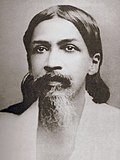This article includes a list of references, related reading, or external links, but its sources remain unclear because it lacks inline citations .(February 2020) |
| Sri Aurobindo |
|---|
 |
Record of Yoga is the personal diary of the Indian philosopher and yogi Sri Aurobindo, recording his yogic practice during the period from 1909 to 1927. [1] The manuscripts document his daily experiments with the Sapta Chatusthaya (Seven Quadrates), a system of seven groups of four elements which served as the programme for his yoga. [2] It uses a specialized terminology including Sanskrit words, abbreviations, and symbols, making it a highly technical text. [3]
In 1977, the editors of the project published a revised and corrected edition of Sri Aurobindo's Complete Works and started the journal Sri Aurobindo: Archives and Research in which over the next 18 years they published the newly discovered writings. Record of Yoga was published in book form in two volumes in 2001. [4] Because of the extensive use of technical terms and abbreviations, a glossary is included to explain the specific meanings Sri Aurobindo adapted for his experience. [5] The work provides the practical background for the "Yoga of Self-Perfection", the fourth part of his major work The Synthesis of Yoga . [6]
